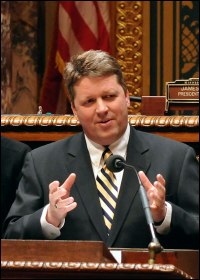Minnesota Prairie Line
 Let’s visualize a bipartisan project, bringing together local, state, and federal stakeholders intent on developing a strong plan with a specific timeline for success. The Minnesota Valley Regional Rail (MVRR) Coalition is “on track” to achieve that success by 2011. The MVRR Authority owns a short line railroad consisting of 94 miles of track between Norwood and Hanley Falls, Minnesota. This rail serves some of the most productive agriculture counties in the state including parts of Sibley County and the towns of Arlington and Green Isle. The rail handles commodities such as corn, fertilizer, biodiesel, ethanol, soybeans, lumber, and canned vegetables.
Let’s visualize a bipartisan project, bringing together local, state, and federal stakeholders intent on developing a strong plan with a specific timeline for success. The Minnesota Valley Regional Rail (MVRR) Coalition is “on track” to achieve that success by 2011. The MVRR Authority owns a short line railroad consisting of 94 miles of track between Norwood and Hanley Falls, Minnesota. This rail serves some of the most productive agriculture counties in the state including parts of Sibley County and the towns of Arlington and Green Isle. The rail handles commodities such as corn, fertilizer, biodiesel, ethanol, soybeans, lumber, and canned vegetables.
On Wednesday, August 20, I attended a meeting of over 100 people in Winthrop, to discuss how a coalition might strengthen support for additional funding at the state and federal level. Also in attendance were State Senators Sheran and Kubly, State Representatives Morrow, Beard, Koenen, and Seifert, and U.S. Congressman Tim Walz.
The rail line’s restoration started in April 2002. Rail traffic has been increasing consistently since service has been restored. The revitalization of the line has sparked additional economic development in the area, including a proposed state of the art waste-to-energy gasification plant in Redwood Falls, creating hi-tech bioengineering jobs and additional economic growth to the region. Heartland Corn Products expanded their ethanol production in Winthrop. This rail can be a link to our smaller communities to keep them economically viable and:
- Keep pressure off our roads, specifically Hwys 19, 14, and 212
- Help keep food products and other goods affordable
- Promote environmentally friendly modes of transportation
While there is growing demand for use of the “Prairie Line” as it is called, the track needs some serious upgrades. Much of the track is made up of 80 pound rail (from the 1880’s) which means the trains can achieve a maximum speed of 7 to 10 mph. To increase the speed to 25 mph, the rails need upgrading and timber trestle bridges will have to be eventually replaced, this at a cost of approximately a half million dollars per mile. Our small town and communities are a vital link to our larger regional centers. They provide jobs and economic support which propels our state as a whole. Reviving the Minnesota Prairie Line is a great example of how we can bring public and private coalitions together for community building, economic development, and rural sustainability.




